
下载亿题库APP
联系电话:400-660-1360

下载亿题库APP
联系电话:400-660-1360

请谨慎保管和记忆你的密码,以免泄露和丢失

请谨慎保管和记忆你的密码,以免泄露和丢失

为了帮助广大考生顺利通过口译笔译考试,帮考网为大家分享了一些口译笔译相关内容,希望大家每天坚持练习,积极备考。
SECTION 1: LISTENING TEST
Part A: Spot Dictation
Directions: In this part of the test, you will hear a passage and read the same passage with blanks in it. Fill in each of the blanks with the word orwords you have heard on the tape. Write your answer in the corresponding space in your ANSWER BOOKLET. Remember you will hear the passage ONLY ONCE.
British people are far more sophisticated about beverages than they were 50 years ago. Witness the Starbucks revolution and you’ll know where ___________ (1) goes. However, spurred on by recent studies suggesting that it can cut the risk of ___________ (2) and retard the aging process, tea is enjoying a ___________ (3).
Although tea is available in more places than ever, it remains to be _____________ (4) of a typical British family.
If you are invited to an English home, _____________ (5) in the morning you get a cup of tea. It is either brought in by a heartily _____________ (6) oran almost malevolently silent maid. When you are _____________ (7) in your sweetest morning sleep you must not say: ‘Go away, you _____________ (8).’ On the contrary, you have to declare with your best five o’clock smile: ‘Thank you very much. I _____________ (9) a cup of tea, especially in the morning.’ If they leave you alone with the liquid you may pour it _____________ (10)!
Then you have ___________ (11); then you have tea at 11 o’clock in the morning; _____________ (12); then you have tea fortea; then after supper; and again at eleven o’clock _____________ (13).
You must not refuse any additional cups of tea under the _____________ (14): if it is hot; if it is cold; if you are _____________ (15); if you are nervous; if you are watching TV; _____________ (16); if you have just returned home; if you feel like it; if you do not feel like it; if you have had no tea ______________ (17); if you have just had a cup.
You definitely must not ______________ (18). I sleep at five o’clock in the morning; I have coffee forbreakfast; I drink innumerable _____________ (19) during the day; I have the _____________ (20) even at tea-time!
Part B: Listening Comprehension
1. Statements
Directions: In this part of the test, you will hear several short statements. These statements will be spoken ONLY ONCE, and you will not find them written on the paper; so you must listen carefully. When you hear a statement, read the answer choices and decide which one is closest in meaning to the statement you have heard. Then write the letter of the answer you have chosen in the corresponding space in your ANSWER BOOKLET.
1. (A) The program on Channel Eight reminds me of TV commercials.
(B) The product advertised in the TV commercial cannot help cure my illness.
(C) I don’t watch TV that much, because of the omnipresent advertisements.
(D) I have to sit on the sofa, because I am too sick to stand in front of the television.
2. (A) The plane arrived at 7:30.
(B) The plane arrived at 8:00.
(C) The plane arrived at 9:00.
(D) The plane arrived at 10:00.
3. (A) I’ll ask someone else to read and check this agreement forerrors.
(B) I’ll think more about the agreement before making a decision.
(C) It’s obvious that I’ll discuss the agreement with my assistant first.
(D) It’s out of question that I should get into any agreement with you.
4. (A) The better members decided to cancel the meeting.
(B) Less than half of the committee was away on business trips.
(C) It’d be better if no one had attended this morning’s committee meeting..
(D) The meeting was cancelled because of low attendance.
5. (A) Supermarkets in the inner city and the suburbs are usually owned by the same company.
(B) Products in grocery stores are more expensive than those in supermarkets.
(C) There is a price difference forthe same product even in shops run by the same company.
(D) People prefer to shop in supermarkets, which are mostly located in the suburbs, with free parking space.
6. (A) Many Americans cannot afford higher education because of the soaring college tuition fees and expenses.
(B) Sending their children to college is no longer a bigger challenge formillions of Americans.
(C) The American government has setthe goal that it will eventually stop funding higher education institutions.
(D) Nowadays, American parents have to pay more to send their children to college.
7. (A) Formany university graduates, the jobs they take will not be related to their academic achievements.
(B) Because of economic recession, the number of university students majoring in liberal arts is declining.
(C) University students who are interested in liberal arts will have more job opportunities upon graduation.
(D) With high unemployment rate, many university students will have to opt fortransferring to other majors.
8. (A) Good business negotiators will never repeat what other people have already restated.
(B) Restating by good business negotiators is not an effective way to check the information.
(C) Good business negotiators are sometimes curious about other people’s restatements.
(D) Restating what others have said is a good strategy forconfirming understanding.
9. (A) We cannot reach an agreement, let alone a spoken promise.
(B) We’d better draft and then sign a written agreement.
(C) We generally keep our promises in business transactions.
(D) We hope you understand why we are unable to keep our promises.
10. (A) I don’t think you have more to say on that topic.
(B) I think we’d better talk about that in detail sometime later.
(C) I am truly appreciative if you can elaborate on that topic after lunch.
(D) I am busy right now, so we might as well discuss it over lunch today.
2. Talks and Conversations
Directions: In this part of the test, you will hear several short talks and conversations After each of these, you will hear a few questions. Listen carefully because you will hear the talk or conversation and questions ONLY ONCE. When you hear a question, read the four choices and choose the best answer to that question. Then write the letter of the answer you have chosen in the corresponding space in your ANSWER BOOKLET.
Questions 11—14
11. (A) Two (B) Three (C) Four (D) Five
12. (A) A profit-making private school.
(B) A non-profit-making independent school.
(C) A state school that is funded by non-governmental sources.
(D) A secondary school that is open to the majority of British students.
13. (A) Many children are no longer placed in schools according to their academic abilities.
(B) Many children can afford to study in private schools, as they become part of the state system.
(C) Children from wealthy families no longer choose to go and study in public schools.
(D) Cleverer children will be sent to the best private schools in the country fora better development.
14. (A) Clever and less bright children will mix well with each other.
(B) School authorities will receive more funds from the government.
(C) Most students will do well in their entrance examination forthe higher education.
(D) Every child will have an equal opportunity to go on to higher education.
Questions 15—18
15. (A) One that is unabridged with detailed definitions.
(B) One that contains fewer words and emphasizes on special words.
(C) One that contains a broad range of words in common usage.
(D) One that spans several volumes and has extensive word histories
16. (A) The New Oxford Picture Dictionary
(B) The American Heritage Dictionary
(C) The Dictionary of Legal Terms
(D) The Drinking Water Dictionary
17. (A) It lists abbreviations, proper nouns, and tables of measures.
(B) It is an unabridged edition providing as many as 500,000 entries.
(C) It was randomly compiled and contains as many foreign words as possible.
(D) It provides detailed information of famous people and places.
18. (A) A school dictionary. (B) A college dictionary.
(C) A general dictionary. (D) A specialized dictionary.
Questions 19—22
19. (A) He’s bought his wife a present. (B) He’s missed an important phone call.
(C) He’s dismissed his new secretary. (D) He’s popped out shopping.
20. (A) Talking about the latest fashion.
(B) Offering special reductions.
(C) Giving bigger discounts to female customers.
(D) Pressing on the customer to make a decision.
21. (A) Upside down and inside out. (B) Inside out and back to front.
(C) With its sleeves as trouser legs. (D) With its pattern upside down.
22. (A) A V-necked pullover with short sleeves.
(B) A high-necked pullover with long sleeves.
(C) A white pullover with a pattern.
(D) A blue pullover with a high neck.
Questions 23—26
23. (A) That of a creator. (B) That of a re-creator.
(C) That of a receiver. (D) That of a performer.
24. (A) Because we need to concentrate for our quiet thought.
(B) Because we want to give full attention to the driving.
(C) Because we try to avoid being caught by the patrolling police.
(D) Because we intend to be as casual as possible in the driving.
25. (A) In the elevator. (B) In the car.
(C) In the bathroom. (D) In the church.
26. (A) By perceptive and analytical listening.
(B) By taking a sonic bath.
(C) By attending classical concerts.
(D) By listening to an emotional piece of music.
Questions 27—30
27. (A) His grandfather’s house. (B) His parents’ remarks.
(C) A magazine. (D) A coursebook.
28. (A) Enjoying visiting zoos. (B) Driving a car.
(C) Making money. (D) Taking kids to a museum.
29. (A) It died a few years ago. (B) It killed several tourists.
(C) It is only a legend. (D) It is a living dinosaur.
30. (A) No one has provided an accurate description of the animal.
(B) No dead bodies of the animal have ever been found.
(C) There are only 500 species living in Loch Ness.
(D) The lake is not deep enough forsuch a huge animal.
Part C: Listening and Translation
1. Sentence Translation
Directions: In this part of the test, you will hear 5 sentences in English. You will hear the sentences ONLY ONCE. After you have heard each sentence, translate it into Chinese and write your version in the corresponding space in your ANSWER BOOKLET.
(1)
(2)
(3)
(4)
(5)
2. Passage Translation
Directions: In this part of the test, you will hear 2 passages in English. You will hear the passages ONLY ONCE. After you have heard each passage, translate it into Chinese and write your version in the corresponding space in your ANSWER BOOKLET. You may take notes while you are listening.
(1)
(2)
看到这里小伙伴们是否有所收获呢?希望帮考网分享的内容能给大家带来帮助,后续也可以多关注帮考网,这里有更多的考试资讯,你想知道的都在这!
 27
27三级笔译和口译考试每年可以考几次?:三级笔译和口译考试每年可以考几次?通常情况下笔译口译考试都是每年两次。上半年一般在1月份报名,5月份考试,下半年一般在7月份报名,11月考试,各省市情况不一,具体情况可上CATTI官网或各省市人事考试网查询。
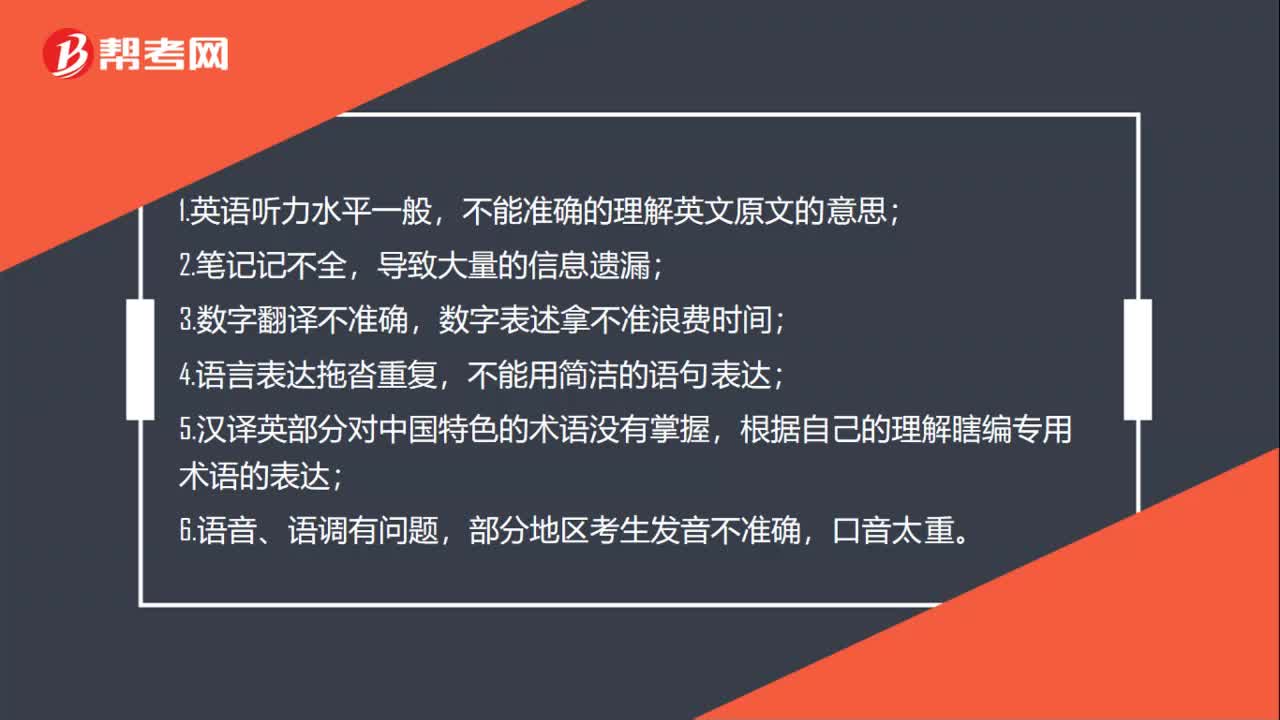 43
43口译考试应注意哪些问题?:口译考试应注意哪些问题?1.英语听力水平一般,不能准确的理解英文原文的意思;2.笔记记不全,导致大量的信息遗漏;3.数字翻译不准确,数字表述拿不准浪费时间;4.语言表达拖沓重复,不能用简洁的语句表达;5.汉译英部分对中国特色的术语没有掌握,根据自己的理解瞎编专用术语的表达;6.语音、语调有问题,部分地区考生发音不准确,口音太重。
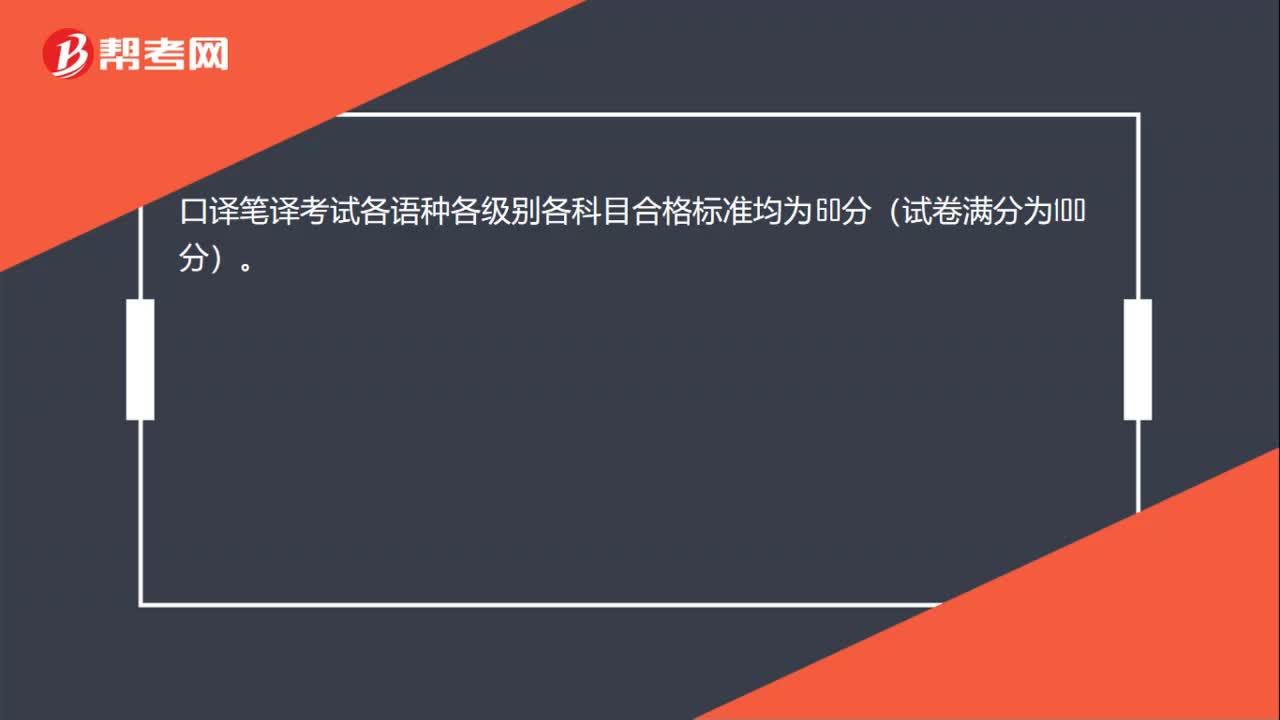 16
16口译笔译考试是多少分及格?:口译笔译考试各语种各级别各科目合格标准均为60分(试卷满分为100分)。
 00:23
00:232020-06-03
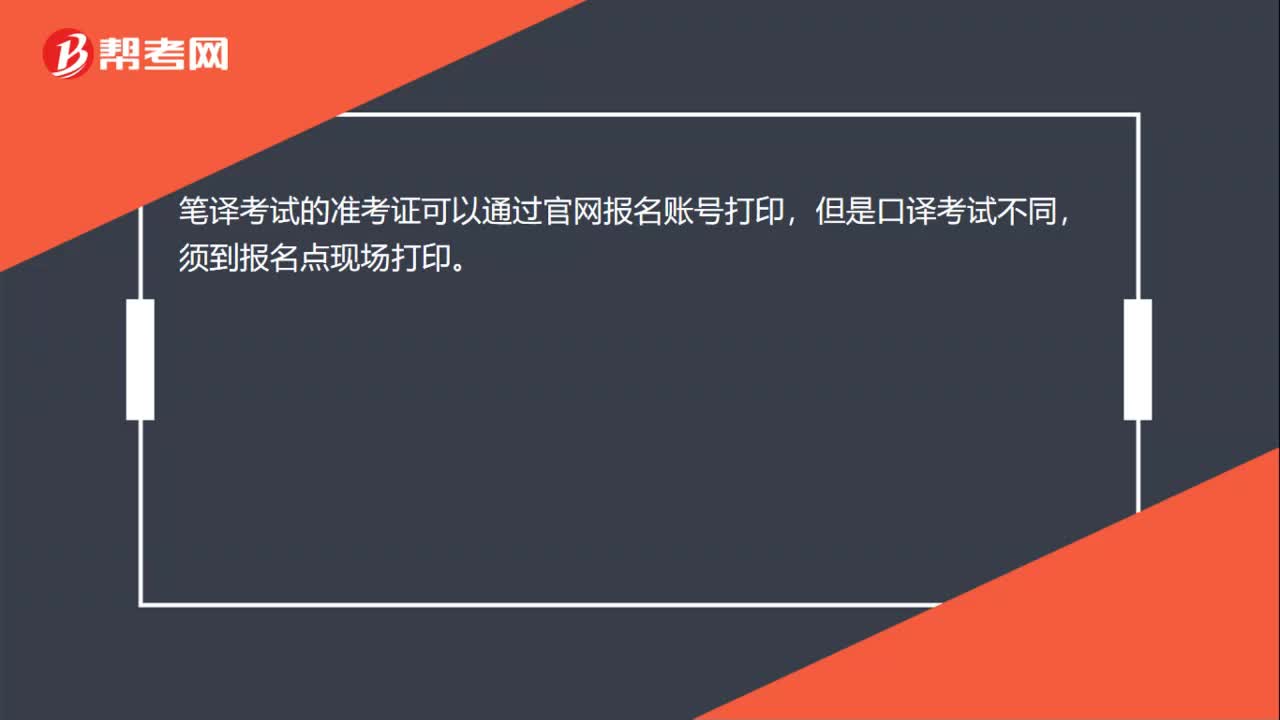 00:15
00:152020-06-03
 00:27
00:272020-06-03
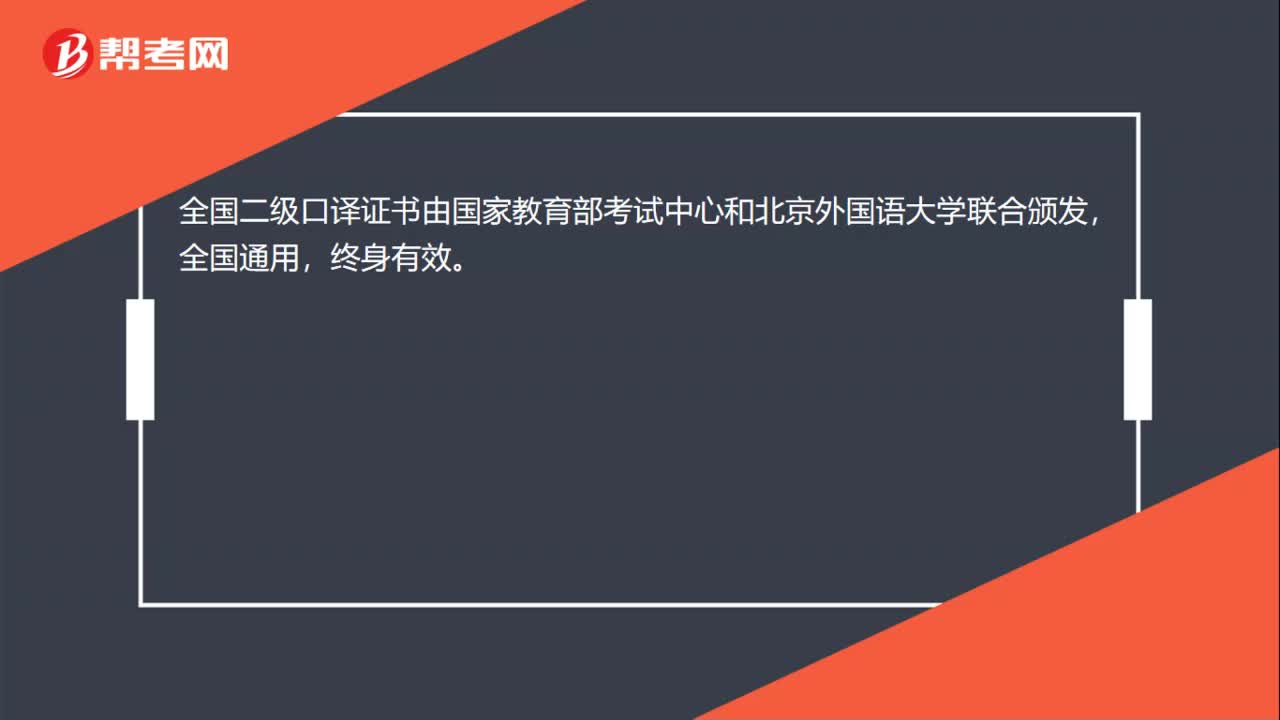 00:17
00:172020-06-03
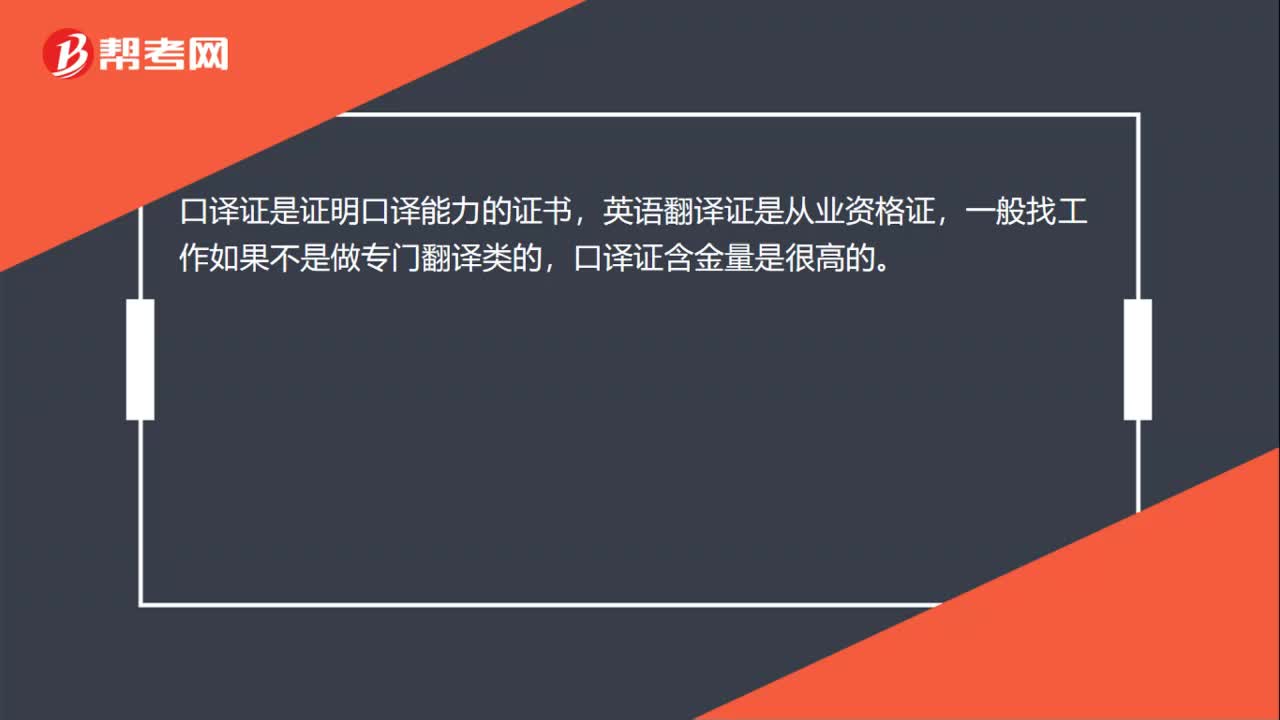 00:17
00:172020-06-03

微信扫码关注公众号
获取更多考试热门资料